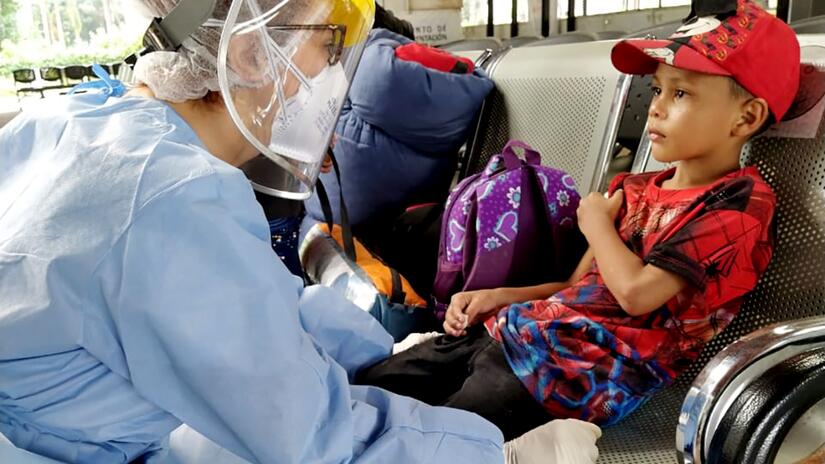In the middle of the “Parque del Agua” in Bucaramanga, Santander, it is possible to watch Colombian Red Cross personnel providing primary health care to migrants during medical days. Entire families come here to be treated. As they wait their turn, standing about 1.5 metres apart, they receive material and advice from National Society volunteers on what COVID-19 is and how to prevent it. This is one of the many activities the Red Cross is carrying out to care for people on the move, one of the populations most affected by COVID-19.
In Colombia, tens of thousands of migrants (especially of Venezuelan nationality) decided to return to their countries of origin to face the crisis. Since the closure of the borders, nearly 60,000 Venezuelans have moved within Colombia.
“The migration scenario has become very complicated,” says Marilyn Bonfante, Director of the Social and Humanitarian Development Unit of the Colombian Red Cross. “There has been an increase in unsatisfied basic needs among migrants, and there has been a setback in social and economic inclusion processes that had advanced significantly prior to the pandemic.”
In addition, Bonfante states that the current conditions of mobility are high risk.
"Irregular recruitment of migrants has been detected and there are risks associated with border crossing on informal routes, especially in Ipiales and Nariño with average flows of 250 people per day".
Despite the complexity of carrying out humanitarian work in the midst of the pandemic, Colombian Red Cross volunteers have responded positively to this reality. The National Society actively works in primary health care, psychosocial support, protection, humanitarian assistance and water distribution. And like other National Societies in the region and the world, it has had to adapt to working in an unprecedented context.
With the intense work carried out, especially in border areas, nearly 40,000 migrants have been reached. The Red Cross provides primary health care through the use of mobile units, at fixed points and by holding health days in public spaces. A telephone line and a WhatsApp line are also available for medical orientation and psychosocial support. Also, protection spaces have been created for children and families who have required emotional support. In these spaces, recreational activities are generated and awareness of the disease and forms of prevention are promoted. In addition, to help provide basic necessities, food kits and cash transfer vouchers have been distributed to nearly 30,000 people.
Given the conditions of the pandemic, special emphasis has been placed on protecting volunteers who are carrying out front-line actions. The National Society has made a tele-assistance line available to its staff and their families. In addition, it has created spaces with its 29 branches to provide support for the mental health and well-being of volunteers. This action has been very effective through virtual links with which 287 members have been reached so far.
In recent weeks, the Colombian Red Cross Society has been working on preparing its volunteers and technical staff to strengthen the response in the field and increase the safety of volunteers during their work.
Article
World Radio Day: How radio helps keep communities healthy and safe
World Radio Day: How radio helps keep communities healthy and safe
| Article

